Thyrogen was compared with THW using 2 different doses of radioiodine in patients with well-differentiated thyroid cancer who had undergone thyroidectomy in the 2 largest, prospective, multicenter, randomized studies performed in thyroid cancer.
- In both studies, patients were randomized to 1 of 4 treatment groups: Thyrogen + 30 mCi, Thyrogen + 100 mCi, THW + 30 mCi, THW +100 mCi. There was no difference in the treatment success rates between the 2 doses of radioiodine.
- Ablation success rates were assessed at approximately 8 months
- In the HiLo trial, ablation success was defined as radioiodine uptake of <0.1% in the thyroid bed and stimulated thyroglobulin levels of <2.0 ng/mL.
- In the ESTIMABL trial, ablation success was defined by neck ultrasound and stimulated thyroglobulin of ≤1.0 ng/mL.
ESTIMABL and HiLO Trials1,2
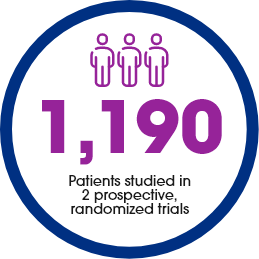
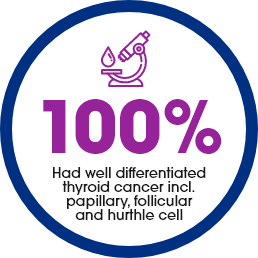
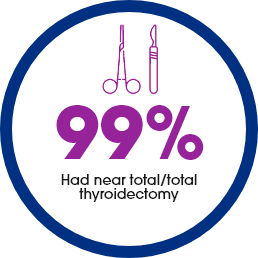
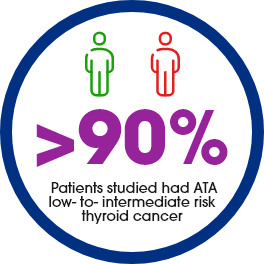
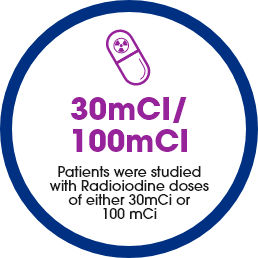
Ablation Success at 8 Months: Data from the 2 largest, randomized clinical trials in differentiated thyroid cancer1,2
Successful remnant ablation rates (HiLo study)1: Randomized 438 patients (tumor stages T1-T3, Nx, N0 and N1, M0)

Successful remnant ablation rates (ESTIMABL study)2: randomized 752 low risk patients

1In the HiLO Study, ablation success was defined as radioiodine uptake of <0.1% in the thyroid bed and stimulated thyroglobulin levels of <2.0 ng/mL.
2In the ESTIMABL Study, ablation success was defined by neck ultrasound and stimulated thyroglobulin of ≤1.0 ng/mL.
Efficacy Results in Radioactive Iodine Ablation (RAI) - 5 year update from the Estimabl and HiLO trials.
Patients receiving Thyrogen had similar recurrence rates as thyroid hormone withdrawal (THW) 5 years post radioiodine remnant ablation3,4
Long term follow up results from 2 large, non-inferiority randomized clinical trials on thyroid cancer demonstrated that American Thyroid Association (ATA) low and intermediate risk patients prepared with Thyrogen for radioactive iodine ablation (RAI) had similar recurrence rates as patients who were prepared with thyroid hormone withdrawal.1,2 Results were also not significantly different between low (30 mCi) and high (100 mCi) dose groups.1,2
A significantly higher proportion of patients in the THW groups exhibited HRQoL deterioration at radioiodine administration compared with the Thyrogen groups. Overall, Thyrogen patients had significantly lower deterioration of HRQoL compared with THW.3,4
5 years post RAI ablation, clinical findings suggest that disease recurrence was not related to the method used to prepare the patient for RAI ablation.3
Comparable outcomes were observed in the patient groups, 98.1% of patients remained recurrence free in the Thyrogen group vs 98.9% in the THW group.
In the ESTIMABL1 Outcomes Study3
Schlumberger M, et al
(726 evaluable patients)
Percentage of patients recurrence free at 5 years

ESTIMABL1 is an open-label, randomized trial involving 752 patients. All patients were randomly assigned (1:1:1:1) to 30 mCi or 100 mCi radioactive iodine dose, each prepared with either Thyrogen or THW. Follow-up consisted of a yearly serum thyroglobulin measurement on levothyroxine treatment. The median follow-up was 5.4 years. No evidence of disease was defined as serum thyroglobulin of ≤1 ng/mL on levothyroxine treatment and normal results on neck ultrasonography.
Thyrogen combinations with RAI had similar recurrence rates vs THW regardless of radioactive iodine dose.3
Thyrogen and low-dose radioactive iodine was as effective as high-dose radioactive iodine combinations. No significant difference (P>0.05) was observed between the radioactive iodine ablation strategy and the number of abnormalities observed.
In the ESTIMABL1 Outcomes Study3
Schlumberger M, et al
(726 evaluable patients)
Percentage of patients with persistent disease at last follow-up

In ATA low to intermediate risk patients
In patients with low to intermediate risk thyroid cancer, Thyrogen like THW, had no apparent impact on the efficacy of ablation based on recurrence rates.4
Recurrence rates were similar among patients who were prepared for ablation with Thyrogen vs those prepared with THW (2.1% vs 2.7%).
In the HiLo Study4
Dehbi H, et al
(434 evaluable patients)
Cumulative recurrence rate at 5 years.

HiLo is a non-inferiority, parallel, open-label, randomized controlled factorial trial involving 438 patients. Patients were randomly assigned (1:1:1:1) to 30 mCi or 100 mCi ablation, each prepared with either Thyrogen or THW. The median follow-up was 6.5 yrs. Patients were followed up at annual clinic visits. Recurrence was defined as any evidence of (usually structural) disease identified during follow-up.2
Disease recurrence was not related to the radioactive iodine doses used in the study, even in intermediate risk patients (T3, N1).4
Despite inclusion of intermediate-risk patients (T3 or N1) in the study population, recurrence rates were similar across the low and high dose radioactive iodine groups (2.1% vs 2.7%).
In the HiLo Study4
Dehbi H, et al
(434 evaluable patients)
Cumulative recurrence rate at 5 years.

Choose how to get Thyrogen (thyrotropin alfa) for your patients
Not sure which one to choose? Contact ThyrogenONE for assistance

Option 1: Sign up or log into the ThyrogenONE portal
The ThyrogenONE portal provides your office online access to help you and your patients :
- Submit and track benefit verifications
- Coordinate orders
- Generate automatic alerts

Option 2: Call ThyrogenONE at 1-88-THYROGEN (1-888-497-6436) (
Dedicated ThyrogenONE Case Managers can assist you and your patients with the following.
- Benefits Verification
- Information on Ordering
- Information on specialty pharmacy fulfillment
Important Safety Information and Indications
Important Safety Information and Indications
IMPORTANT SAFETY INFORMATION
CONTRAINDICATIONS
If Thyrogen is administered with radioiodine, the contraindications to radioiodine also apply to this combination regimen. Refer to the radioiodine prescribing information for a list of contraindications for radioiodine.
WARNINGS AND PRECAUTIONS
Thyrogen-Induced Hyperthyroidism:
- There have been reports of death in non-thyroidectomized patients and in patients with distant metastatic thyroid cancer in which events leading to death occurred within 24 hours after administration of Thyrogen. Caution should be exercised in patients who have substantial thyroid tissue still in situ or functional thyroid cancer metastases, specifically in the elderly and those with a known history of heart disease.
- Hospitalization for administration of Thyrogen and post-administration observation in patients at risk should be considered.
Stroke:
- There are post marketing reports of stroke in young women with risk factors for stroke, and neurological findings suggestive of stroke (e.g., unilateral weakness) occurring within 72 hours of Thyrogen administration in patients without known central nervous system metastases. The relationship between Thyrogen administration and stroke is unknown. Patients should be well-hydrated prior to treatment with Thyrogen.
Sudden Rapid Tumor Enlargement:
- Sudden, rapid and painful enlargement of residual thyroid tissue or distant metastases can occur following treatment with Thyrogen. Pretreatment with glucocorticoids should be considered for patients in whom tumor expansion may compromise vital anatomic structures.
Risks Associated with Radioiodine Treatment:
- If Thyrogen is administered with radioiodine (RAI), the warnings and precautions for RAI apply to this combination regimen. Refer to the RAI prescribing information for a full list of the warnings and precautions for RAI.
ADVERSE REACTIONS
The most common adverse reactions reported in clinical trials were nausea and headache.
USE IN SPECIFIC POPULATIONS
Pregnancy:
- If Thyrogen is administered with radioiodine, the combination regimen is contraindicated in pregnant women.
- Available data with Thyrogen use in pregnant women are insufficient to evaluate for a drug-associated risk of major birth defects, miscarriage, or adverse maternal or fetal outcomes.
Lactation:
- The concomitant use of Thyrogen and radioiodine (RAI) is contraindicated in lactating women. If Thyrogen is administered with RAI for diagnostic use, discontinue breastfeeding after RAI administration because of the potential for serious adverse reactions from RAI in the breastfed infant.
- If Thyrogen is not administered with RAI, the developmental and health benefits of breastfeeding should be considered along with the mother’s clinical need for Thyrogen and any potential adverse effects on the breastfed child. There are no available data on the presence of thyrotropin alfa in human milk, the effects on the breastfed infant, or the effects on milk production.
Pediatric Use: Safety and effectiveness in pediatric patients have not been established.
Geriatric Use: Results from controlled trials do not indicate a difference in the safety and efficacy of Thyrogen between adult patients less than 65 years and those over 65 years of age.
Renal Impairment: Elimination of Thyrogen is significantly slower in dialysis-dependent end stage renal disease patients, resulting in prolonged elevation of TSH levels.
INDICATIONS AND USAGE
Thyrogen® (thyrotropin alfa) is a thyroid stimulating hormone indicated for:
Adjunctive Diagnostic Tool for Well-Differentiated Thyroid Cancer: Use as an adjunctive diagnostic tool for serum thyroglobulin (Tg) testing with or without radioiodine imaging in the follow-up of patients with well-differentiated thyroid cancer who have previously undergone thyroidectomy.
Limitations of Use:
- Thyrogen-stimulated Tg levels are generally lower than, and do not correlate with Tg levels after thyroid hormone withdrawal.
- Even when Thyrogen-Tg testing is performed in combination with radioiodine imaging, there remains a risk of missing a diagnosis of thyroid cancer or underestimating the extent of the disease.
- Anti-Tg Antibodies may confound the Tg assay and render Tg levels uninterpretable.
Adjunct for Thyroid Remnant Ablation in Well-Differentiated Thyroid Cancer: Use as an adjunctive treatment for radioiodine ablation of thyroid tissue remnants in patients who have undergone a near-total or total thyroidectomy for well-differentiated thyroid cancer and who do not have evidence of distant metastatic thyroid cancer.
Limitations of Use:
- The effect of Thyrogen on thyroid cancer recurrence greater than 5 years post-remnant ablation has not been evaluated.
Click here for full Prescribing Information
Important Safety Information and Indications
IMPORTANT SAFETY INFORMATION
CONTRAINDICATIONS
If Thyrogen is administered with radioiodine, the contraindications to radioiodine also apply to this combination regimen. Refer to the radioiodine prescribing information for a list of contraindications for radioiodine.
WARNINGS AND PRECAUTIONS
Thyrogen-Induced Hyperthyroidism:
- There have been reports of death in non-thyroidectomized patients and in patients with distant metastatic thyroid cancer in which events leading to death occurred within 24 hours after administration of Thyrogen. Caution should be exercised in patients who have substantial thyroid tissue still in situ or functional thyroid cancer metastases, specifically in the elderly and those with a known history of heart disease.
- Hospitalization for administration of Thyrogen and post-administration observation in patients at risk should be considered.
Stroke:
- There are post marketing reports of stroke in young women with risk factors for stroke, and neurological findings suggestive of stroke (e.g., unilateral weakness) occurring within 72 hours of Thyrogen administration in patients without known central nervous system metastases. The relationship between Thyrogen administration and stroke is unknown. Patients should be well-hydrated prior to treatment with Thyrogen.
Sudden Rapid Tumor Enlargement:
- Sudden, rapid and painful enlargement of residual thyroid tissue or distant metastases can occur following treatment with Thyrogen. Pretreatment with glucocorticoids should be considered for patients in whom tumor expansion may compromise vital anatomic structures.
Risks Associated with Radioiodine Treatment:
- If Thyrogen is administered with radioiodine (RAI), the warnings and precautions for RAI apply to this combination regimen. Refer to the RAI prescribing information for a full list of the warnings and precautions for RAI.
ADVERSE REACTIONS
The most common adverse reactions reported in clinical trials were nausea and headache.
USE IN SPECIFIC POPULATIONS
Pregnancy:
- If Thyrogen is administered with radioiodine, the combination regimen is contraindicated in pregnant women.
- Available data with Thyrogen use in pregnant women are insufficient to evaluate for a drug-associated risk of major birth defects, miscarriage, or adverse maternal or fetal outcomes.
Lactation:
- The concomitant use of Thyrogen and radioiodine (RAI) is contraindicated in lactating women. If Thyrogen is administered with RAI for diagnostic use, discontinue breastfeeding after RAI administration because of the potential for serious adverse reactions from RAI in the breastfed infant.
- If Thyrogen is not administered with RAI, the developmental and health benefits of breastfeeding should be considered along with the mother’s clinical need for Thyrogen and any potential adverse effects on the breastfed child. There are no available data on the presence of thyrotropin alfa in human milk, the effects on the breastfed infant, or the effects on milk production.
Pediatric Use: Safety and effectiveness in pediatric patients have not been established.
Geriatric Use: Results from controlled trials do not indicate a difference in the safety and efficacy of Thyrogen between adult patients less than 65 years and those over 65 years of age.
Renal Impairment: Elimination of Thyrogen is significantly slower in dialysis-dependent end stage renal disease patients, resulting in prolonged elevation of TSH levels.
INDICATIONS AND USAGE
Thyrogen® (thyrotropin alfa) is a thyroid stimulating hormone indicated for:
Adjunctive Diagnostic Tool for Well-Differentiated Thyroid Cancer: Use as an adjunctive diagnostic tool for serum thyroglobulin (Tg) testing with or without radioiodine imaging in the follow-up of patients with well-differentiated thyroid cancer who have previously undergone thyroidectomy.
Limitations of Use:
- Thyrogen-stimulated Tg levels are generally lower than, and do not correlate with Tg levels after thyroid hormone withdrawal.
- Even when Thyrogen-Tg testing is performed in combination with radioiodine imaging, there remains a risk of missing a diagnosis of thyroid cancer or underestimating the extent of the disease.
- Anti-Tg Antibodies may confound the Tg assay and render Tg levels uninterpretable.
Adjunct for Thyroid Remnant Ablation in Well-Differentiated Thyroid Cancer: Use as an adjunctive treatment for radioiodine ablation of thyroid tissue remnants in patients who have undergone a near-total or total thyroidectomy for well-differentiated thyroid cancer and who do not have evidence of distant metastatic thyroid cancer.
Limitations of Use:
- The effect of Thyrogen on thyroid cancer recurrence greater than 5 years post-remnant ablation has not been evaluated.
Click here for full Prescribing Information
References
1) Mallick U, Harmer C, Yap B, et al. Ablation with low-dose radioiodine and thyrotropin alfa in thyroid cancer. N Engl J Med. 2012;366(18):1674-1685.
2) Schlumberger et al. Strategies of Radioiodine Ablation in Patients with Low-Risk Thyroid Cancer. N Engl J Med. 2012. vol. 366 no. 18
3) Schlumberger M, Leboulleux S, Catargi B, et al. Outcome after ablation in patients with low-risk thyroid cancer (ESTIMABL1): 5-year follow-up results of a randomized, phase 3, equivalence trial. Lancet Diabetes Endocrinol. 2018;6(8):618-626.
4) Dehbi HM, Mallick U, Wadsley J, Newbold K, Harmer C, Hackshaw A. Recurrence after low-dose radioiodine ablation and recombinant human thyroid stimulating hormone for differentiated thyroid cancer (HiLo): long-term results of an open-label, non-inferiority randomized controlled trial. Lancet Diabetes Endocrinol. 2019;7(1):44-51.

.png)

.jpg 400w, /.imaging/webp/sanofi-platform/img-w500/dam/Thyrogen-hcp/efficacy-in-rai-ablation/pagebanner--2-.jpg/jcr:content/pagebanner%20(2).jpg 500w)
